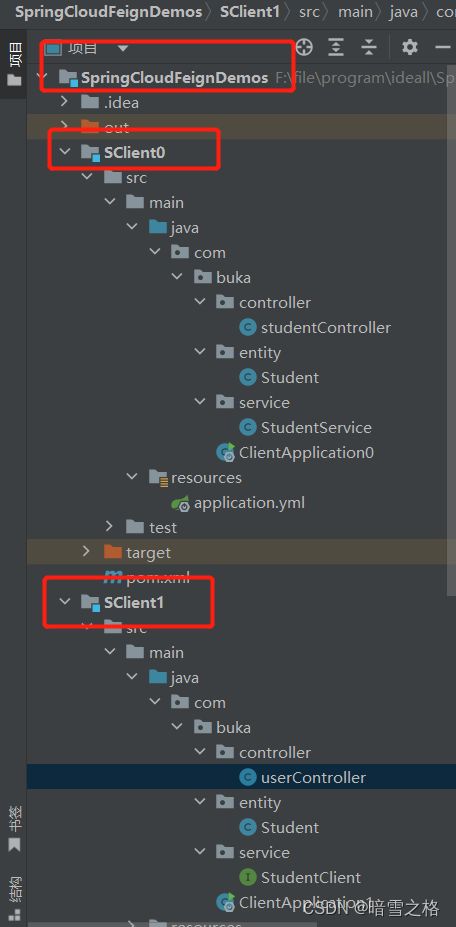利用Eureka和Feign实现两个微服务之间的调用
根据上篇文章(在Eureka中注册多个服务(根据本地主机端口号区分)),我们已经掌握了Eureka的注入方法。
本次我们需要实现微服务之间的调用,其实是将两个客户端注入Eureka,具体就是换一个注解。
目的:用SClient1中的controller调用SClient0中相应的方法。

项目结构
Pom依赖
在最外层Pom中写入
<parent>
<groupId>org.springframework.bootgroupId>
<artifactId>spring-boot-starter-parentartifactId>
<version>2.1.4.RELEASEversion>
parent>
<dependencies>
<dependency>
<groupId>org.springframework.cloudgroupId>
<artifactId>spring-cloud-starter-netflix-eureka-serverartifactId>
<version>2.1.0.RELEASEversion>
dependency>
dependencies>
<dependencyManagement>
<dependencies>
<dependency>
<groupId>org.springframework.cloudgroupId>
<artifactId>spring-cloud-dependenciesartifactId>
<version>Greenwich.SR1version>
<type>pomtype>
<scope>importscope>
dependency>
dependencies>
dependencyManagement>
SServer不用单独写依赖,另外两个均需加入入下依赖
<dependency>
<groupId>org.springframework.cloudgroupId>
<artifactId>spring-cloud-starter-openfeignartifactId>
dependency>
程序
SServer中的ServerApplication
package com.buka;
import org.springframework.boot.SpringApplication;
import org.springframework.boot.autoconfigure.SpringBootApplication;
import org.springframework.cloud.netflix.eureka.server.EnableEurekaServer;
@SpringBootApplication
@EnableEurekaServer
public class ServerApplication {
public static void main(String[] args) {
SpringApplication.run(ServerApplication.class, args);
System.out.println("注册中心启动!!!");
}
}
application.yml
server:
port: 6869
spring:
application:
name: eureka
eureka:
instance:
hostname: EurekaServer
client:
service-url:
defaultZone: http://127.0.0.1:${server.port}/eureka/
register-with-eureka: false
SClient0中的ClientApplication0
@SpringBootApplication
@EnableEurekaClient
@EnableFeignClients
public class ClientApplication0 {
public static void main(String[] args) {
SpringApplication.run(ClientApplication0.class,args);
System.out.println("学生端启动!!!");
}
}
Student类
public class Student {
private Integer id;
private String name;
private Integer age;
public Integer getId() {
return id;
}
public void setId(Integer id) {
this.id = id;
}
public String getName() {
return name;
}
public void setName(String name) {
this.name = name;
}
public Integer getAge() {
return age;
}
public void setAge(Integer age) {
this.age = age;
}
}
StudengService
@Service
public class StudentService {
public List<Student> queryStudents(Integer id){
System.out.println(id);
Student s1=new Student();
s1.setId(1);
s1.setName("小明");
s1.setAge(18);
Student s2=new Student();
s2.setId(2);
s2.setName("小丽");
s2.setAge(18);
List<Student> studentList = new ArrayList<>();
studentList.add(s1);
studentList.add(s2);
return studentList;
}
}
StudentController
@RestController
public class studentController {
@Autowired
private StudentService studentService;
@RequestMapping(value = "/querystudents/{id}")
public List<Student> queryStudents(@PathVariable("id") Integer id){
return studentService.queryStudents(id);
}
}
application.yml
server:
port: 6870
spring:
application:
name: eureka2
eureka:
instance:
hostname: EurekaServer2
client:
service-url:
defaultZone: http://127.0.0.1:6869/eureka/
SClient1中的ClientApplication1
@SpringBootApplication
@EnableEurekaClient
@EnableFeignClients
public class ClientApplication1 {
public static void main(String[] args) {
SpringApplication.run(ClientApplication1.class,args);
System.out.println("用户端启动!!!");
}
}
Student类如上
StudentClient接口
@Service
@FeignClient(value = "eureka2",url="http://127.0.0.1:6870")
public interface StudentClient {
@RequestMapping(value = "/querystudents/{id}")
@LoadBalanced
public List<Student> queryStudents(@PathVariable("id") Integer id);
}
userController
@RestController
public class userController {
@Autowired
private StudentClient studentClient;
@ResponseBody
@RequestMapping(value = "/userstudents/{id}")
public List<Student> userQueryStudents(@PathVariable("id") Integer id){
return studentClient.queryStudents(id);
}
}
注意:上面的方法中我传送了一个id,它没有实际的作用,只是给大家展示一下应该如何进行传参。
运行
http://localhost:6871/userstudents/1

这里可以显示在SClient0中实际编写的方法

